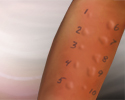Allergy shots
Allergy injections; Allergen immunotherapy
An allergy shot is a medicine that is injected into your body to treat allergy symptoms.
What are Allergy Shots?
An allergy shot contains a small amount of an allergen. This is a substance that causes an allergic reaction. Examples of allergens include:
- Mold spores
- Dust mites
- Animal dander
- Pollen
- Insect venom
A health care provider gives you the shots for 3 to 5 years. This series of allergy shots may help reduce your allergy symptoms.
Work with your provider to identify which allergens are causing your symptoms. This is often done through allergy skin testing or blood tests. Only the allergens you are allergic to are in your allergy shots.
Allergy shots are only one part of an allergy treatment plan. You may also take allergy medicines while having allergy shots. Your provider may recommend that you reduce your exposure to allergens, as well.
How do Allergy Shots Work?
Allergy symptoms occur when your immune system tries to attack an allergen in your body. When this happens, your body creates mucus. This can cause bothersome symptoms in the nose, eyes, and lungs.
Treatment with allergy shots is also called immunotherapy. When a small amount of an allergen is injected into your body, your immune system makes a substance called an antibody that blocks the allergen from causing symptoms.
After several months of shots, some or all of your symptoms may be relieved. Relief can last several years. For some people, allergy shots can prevent new allergies and reduce asthma symptoms.
Who can Benefit From Allergy Shots?
You may benefit from allergy shots if you have:
- Asthma that allergies make worse
- Allergic rhinitis, allergic conjunctivitis
- Insect bite sensitivity
- Eczema, a skin condition that a dust mite allergy can make worse
Allergy shots are effective for common allergens such as:
- Weed, ragweed, tree pollen
- Grass
- Mold or fungus
- Animal dander
- Dust mites
- Insect stings
- Cockroaches
Adults (including the older people) as well as children 5 years and older can receive allergy shots.
Your provider is not likely to recommend allergy shots for you if you:
- Have severe asthma.
- Have a heart condition.
- Take certain medicines, such as ACE inhibitors or beta-blockers.
- Are pregnant. Pregnant women should not begin allergy shots. But, they may be able to continue allergy shot treatment that was started before they became pregnant.
Food allergies are not treated with allergy shots.
Getting Your Allergy Shots
You will get your allergy shots at your provider's office. They are usually given in the upper arm. The typical schedule is:
- For the first 3 to 6 months, you receive shots about 1 to 3 times a week.
- For the next 3 to 5 years, you receive the shots less often, about every 4 to 6 weeks.
Keep in mind that many visits are needed to get the full effects of this treatment. Your provider will assess your symptoms now and then to help decide when you can stop receiving the shots.
Side Effects
An allergy shot may cause a reaction on the skin, such as redness, swelling, and itching. Some people have mild nasal stuffiness or a runny nose.
Though rare, an allergy shot can also cause a severe life-threatening allergic reaction called anaphylaxis. Because of this, you may need to stay in your provider's office for 30 minutes after your shot to check for this reaction.
You may also need to take an antihistamine or another medicine before your allergy shot appointments. This may prevent reactions to the shot at the injection site, but it does not prevent anaphylaxis.
Reactions to allergy shots can be treated in your provider's office right away.
When to Call the Doctor
Contact your provider if you:
- Continue to have symptoms after several months of allergy shots
- Have questions or concerns about the allergy shots or your symptoms
- Have trouble keeping appointments for your allergy shots
References
Dykewicz MS, Wallace DV, Amrol DJ, et al. Rhinitis 2020: A practice parameter update. J Allergy Clin Immunol. 2020;146(4):721-767. PMID: 32707227 pubmed.ncbi.nlm.nih.gov/32707227/.
Golden DBK. Insect allergy. In: Burks AW, Holgate ST, O'Hehis RE, et al, eds. Middleton's Allergy: Principles and Practice. 9th ed. Philadelphia, PA: Elsevier; 2020:chap 76.
Nelson HS. Injection immunotherapy for inhalant allergens. In: Burks AW, Holgate ST, O'Hehis RE, et al, eds. Middleton's Allergy: Principles and Practice. 9th ed. Philadelphia, PA: Elsevier; 2020:chap 85.
Review Date: 10/30/2021
Reviewed By: Stuart I. Henochowicz, MD, FACP, Clinical Professor of Medicine, Division of Allergy, Immunology, and Rheumatology, Georgetown University Medical School, Washington, DC. Also reviewed by David Zieve, MD, MHA, Medical Director, Brenda Conaway, Editorial Director, and the A.D.A.M. Editorial team.


